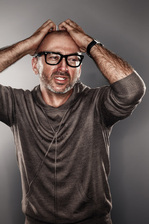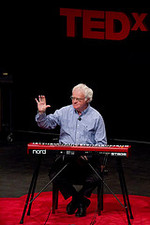TEDX Sydney: Were the ideas worth spreading?
 After attending TEDX Sydney for the second year, Simon Bloomfield, who is creative director on American Express for Ogilvy & Mather Sydney asks whether any of the ideas presented are worth spreading.
After attending TEDX Sydney for the second year, Simon Bloomfield, who is creative director on American Express for Ogilvy & Mather Sydney asks whether any of the ideas presented are worth spreading.
The second annual TEDx Sydney has come and gone (or the third if you count the one not organized by Remo), and a few days later I sit pondering what I found of it.
There’s no doubt it was a brilliantly organised, thoroughly fascinating, and somewhat overwhelming day in the Carriageworks surrounds, but there’s been one thing gnawing away at me: I didn’t walk away from it as inspired to do something as I did after attending TEDx Sydney 2010.
Was I the cynical old hand, compared to the many starry-eyed TEDx virgins in attendance? Or was it something else?
I’ll be honest and say things didn’t start well when everyone bar the back two rows (containing the designated “blogging community”) were asked to switch off all electrical devices. How were we supposed to spread the ideas if we couldn’t take note of them? (#tweettweet?) I confess I didn’t turn my iPad off but felt conspicuous when I did try to jot something down.
But I don’t think that was the main problem.
Try as I might, five days later I can’t really recall hearing any big ideas that were really worth spreading. At 2010’s event, Rachel Botsman delivered her first presentation on Collaborative Consumption, and whether you were into it or not, it was an idea that has well and truly spread from that point to all corners of the world.
Sure there were plenty of ideas that made sense – Katherine Samaras’ presentation on obesity certainly was that. But if parts of the US are already looking at it – read here about Arizona’s plans to tax the obese – then it’s hardly revolutionary.
 And there were ideas I certainly agreed with – I went home and told my wife I wanted to take my girls out of ballet and get them into an instrumental music program thanks to Richard Gill’s speech (pictured). But after two years of end of year concerts that look like someone’s trying to herd cats – it was hardly going to require a big push. (Question is will screeching cats be any better?)
And there were ideas I certainly agreed with – I went home and told my wife I wanted to take my girls out of ballet and get them into an instrumental music program thanks to Richard Gill’s speech (pictured). But after two years of end of year concerts that look like someone’s trying to herd cats – it was hardly going to require a big push. (Question is will screeching cats be any better?)
There were loads of interesting people doing loads of interesting things – Drew Berry the biomedical animator; Josh Cook the bird behaviourist; Bryan Gaensler the astronomer; Johanna Featherstone the poetry advocate (yep, not sure what that means, but she was cool) … the list could go on. Everyone was really interesting to listen to.
 But I reckon other than Saul Griffith – who wanted to (re)spread the idea that the future should be awesome (robot shark submarines, anyone?); and Genevieve Bell (pictured), who told me it was OK to be bored every once in a while (and revived my faith in big corporations like Intel at the same time), there was no one else that really got me thinking.
But I reckon other than Saul Griffith – who wanted to (re)spread the idea that the future should be awesome (robot shark submarines, anyone?); and Genevieve Bell (pictured), who told me it was OK to be bored every once in a while (and revived my faith in big corporations like Intel at the same time), there was no one else that really got me thinking.
Except I did think that the upcoming Daniel Johns/Josh Wakely collaboration was likely to end in disaster. But boy can he sing.
Yes, I loved the day, and yes I’ll be clamouring for a ticket again next year (providing this post doesn’t put me on the outer with the organisers), but I just hope third time round I walk out burning to make a difference somewhere.
Then it’s up to me spread something.

6 Comments
http://mitpress.mit.edu/catalog/browse/browse.asp?btype=8&pid=3
simon if you want a good, inspiring brain strain, cosy up with a book. This series will blow your mind. this is where the REAL thinkers live.
When the CEOs, Christ the CFOs are attending, TED is DEAD.
Ideas worth spreading has quickly become ideas worth stealing, exploiting monetizing, and the exclusivity, especially to the corporately connected for the talks themselves is the conduit to the decline.
1.20. Like stale bread u should be used for stuffing. Move to the country son. Ur well past pasture.
7.19, can you explain why intellectual types always love to put things in brackets?
Semiotext(e)
And how do you pronounce that? Is it “Semi-o-texty” or “semi-oh-text”? And what does it mean? Semiotics in text? Plus an e? Or … what?
They were doing the brackets thing when I was at uni 20 years ago and I didn’t understand it then. I’ll admit I still don’t.
But maybe it’s just (me).
On another topic, why do we always want to be the first to pronounce something ‘dead’ or ‘over’? Doesn’t it depend who the individual speakers are, and what they offer? Seems to me the spirit of it is still alive, and there are still some amazing speakers on TED generally (I haven’t seen any of the Sydney ones). So why declare it dead?
Get up next year champ and inspire us
For the record – Simon was CD now he’s group head, not sure if you can pass that off as a CD?